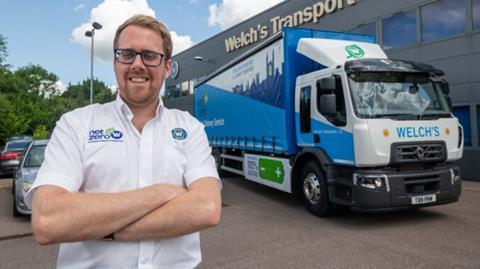In a landmark year, Welch Group has made significant strides in sustainable logistics, being the first haulier in the UK to deploy the new 42-tonne electric HGV from Renualt; joining forces with Cambridge University and tech firm Syselek to launch its ENROUTE project researching the viability of shared user charging; installing and making publicly available its own HGV supercharger at its Duxford depot, not to mention being heavily involved in eFREIGHT 2030 consortium. The company is certainly not sitting still when it comes to decarbonising its fleet and shows just how much can be acheived in a year when you put your mind to it.
FCZ asked Welch’s to share their key moments of 2024, along with their predictions and hopes for the industry for next year. Jamie Sands, Head of Solutions at Welch Group, responded.

Most significant breakthrough in 2024?
The Zero Emission HGV and Infrastructure Demonstrator Programme (ZEHID) marks a decisive shift from ambition to action. This commitment to deploy 370 zero-emission HGVs and establish 57 refuelling and Charging sites demonstrates genuine government backing for our sector’s transformation. This investment provides both the infrastructure backbone and confidence needed for operators to accelerate their transition to zero-emission vehicles.
Biggest unresolved challenge?
Grid connection capacity and timelines remain our sector’s critical bottleneck. Despite advancing vehicle technology and growing operator commitment, securing adequate power infrastructure continues to impact electrification pace. The mismatch between ambition and infrastructure reality is particularly acute for operators and logistics hubs implementing high-capacity chargers for HGVs, creating significant delays in deployment schedules.
Most proud of?
At Welch Group, our successful deployment of a 42-tonne electric HGV has been transformative. As part of the eFREIGHT 2030 consortium, we’re demonstrating that electric HGVs are not just viable but advantageous for regional operations. The installation of our public access HGV supercharger at Duxford depot further supports the wider industry’s transition, creating a hub for sustainable logistics in the region.
2024 reflection?
This year marked the crucial shift from planning to implementation in our sector’s decarbonisation journey. We’ve seen real progress in infrastructure development and vehicle deployment, setting strong foundations for accelerated change in 2025.
2025 and beyond
Looking at the bigger picture - optimistic or pessimistic?
Decidedly optimistic. While grid challenges persist, the convergence of technology, data integration, and sustainability solutions is creating unprecedented opportunities for efficient decarbonisation. The industry is demonstrating remarkable adaptability and innovation in addressing these challenges, suggesting we’re on the cusp of significant breakthroughs.

Areas needing acceleration?
The integration of advanced technologies with decarbonisation efforts needs to move faster. We need hyper-automation and predictive analytics working alongside zero-emission vehicles to maximize efficiency gains and environmental benefits. The focus should be on creating smart, integrated solutions that address both operational efficiency and environmental impact simultaneously.
Collaborative initiative giving confidence?
The ACT 1.5 Climate Action Accelerator event in Bristol perfectly demonstrated how cross-sector collaboration can drive real change. Seeing Zenobē’s second-life battery units from electric buses powering a major event, alongside Volta’s electric trucks handling logistics, shows how our sector’s innovations can enable wider societal transformation. This type of practical collaboration, proving the reliability and scalability of zero-emission solutions, gives me confidence that we’ll see more ambitious cross-industry partnerships in 2025.
Additional thoughts for the year ahead?
2025 will be about making decarbonisation smarter, not just greener. The combination of AI-driven efficiency, predictive analytics, and zero-emission vehicles will create a multiplier effect on carbon reduction efforts. We’re moving beyond viewing decarbonisation in isolation, instead embracing it as part of a wider technological transformation that will reshape how we think about logistics efficiency and sustainabilit















